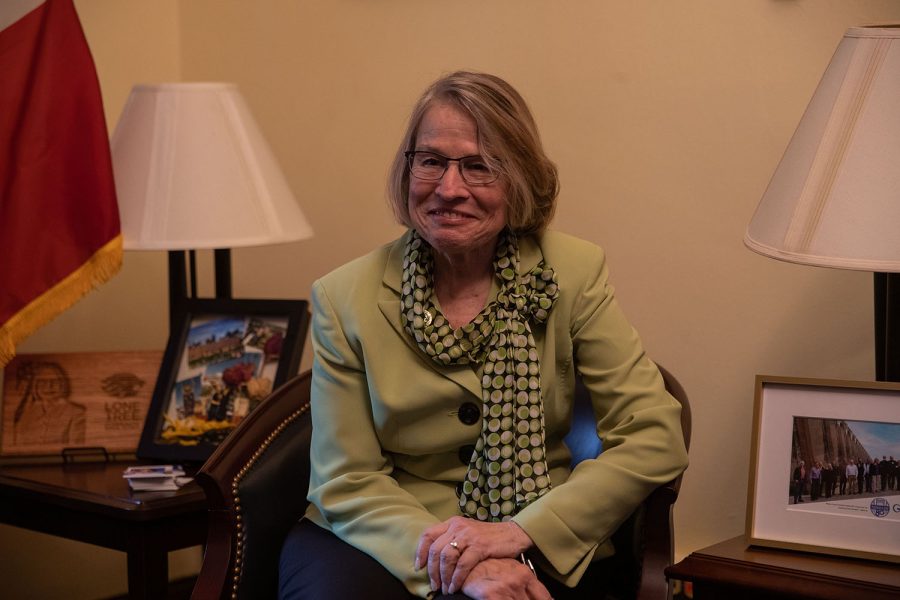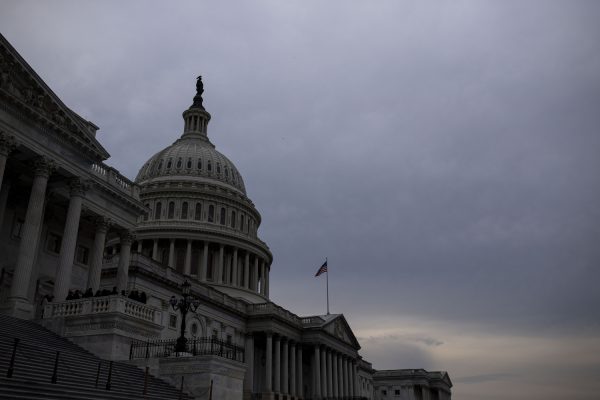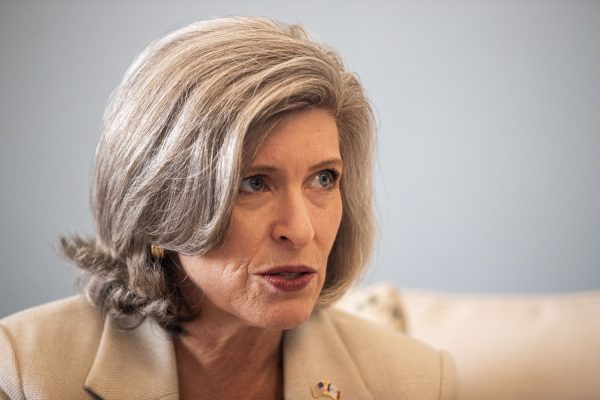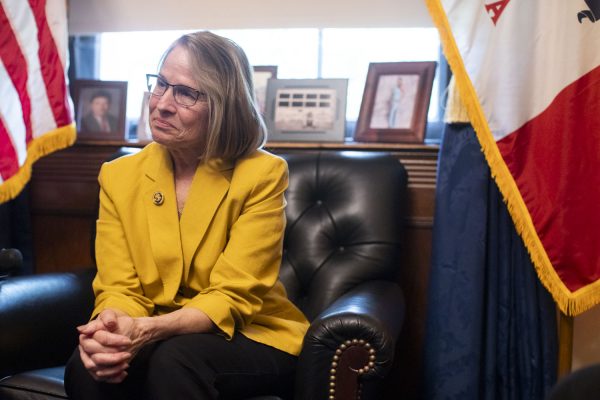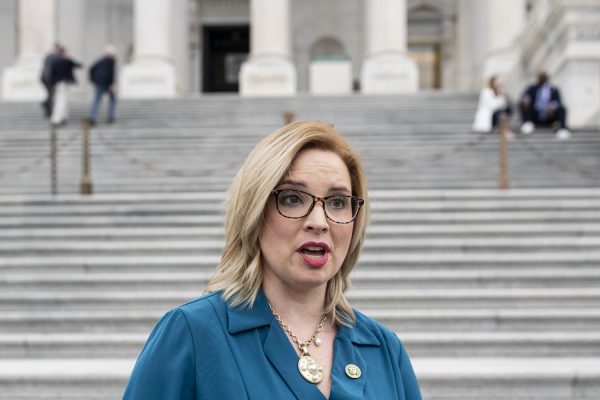Q&A | Rep. Mariannette Miller-Meeks talks about parents right, social media platforms
The Daily Iowan sat down with Rep. Mariannette Miller-Meeks and discussed topics such as the U.S. working with Chinese companies, parents rights, and access to gender-affirming care.
Iowa representative Mariannette Miller-Meeks is seen in her office in the Longworth House Office Building in Washington D.C. The DI sat down with Miller-Meeks to discuss recent state and national legislation.
March 28, 2023
WASHINGTON — The Daily Iowan was at the nation’s capital Monday where reporters met with Republican Rep. Mariannette Miller-Meek to talk about social media platform regulations, parental rights, and access to gender-affirming care.
This interview has been edited for length and clarity.
The Daily Iowan: How is Congress evolving to work with Chinese companies, especially with a push for a Tiktok ban from some members?
Rep. Mariannette Miller-Meeks: So, I think that there are two things. One is how we work with Chinese companies, with whom we have a great trading relationship with China. There are issues with that trading relationship with China when it comes to agricultural products or other products. One of them is intellectual property theft.
One of them is a refusal of cargo when it comes into ports and then it spoils and then it has to be sent back and it’s not accepted and not paid, even though the cargo as received was not spoiled. And then the other is other unfair trading practices.
So, I think there are two things. One is that we certainly want as a country and as a state to do business with China. They’re a trading partner that we want to continue to develop, but we also have irregularities and poor practices that have to be addressed as well. Second, Tik Tok isn’t just a Chinese company or a US company that does business with China. TikTok is a company as you know, very popular, so very popular with young people, but it is a company that its parent company is byte dance, and the Chinese Communist Party requires any company that is based in China to turn over all its data access to the Chinese Communist Party.
So, when you have a multinational company doing business in the United States and we are their largest consumer customer base. Most of the content that is shared from Tik Tok comes from us subscribers, but you have data that’s turned over to the Chinese Communist Party. They track keystrokes. They collect credit card data. They collect password information so all of this puts the US at risk especially when it comes to national security. So, it is a data privacy issue.
It is an issue with tracking information, tracking what you put in, they can also use that to track and punish Chinese citizens or Chinese people who have immigrated to the US to become US citizens and then to track their family back in China so that they can crack down on whatever dissidents they think or people that are critical of the Chinese Communist Party.
And then the next thing is content feeding under the algorithm of Tik Tok, so precisely what’s the algorithm? What kind of content is self-delivered to young people and the age of young people so do all of the social media platforms have age limits on them? But there have been violations of those age limits with Tik Tok.
They straightened those age limits, but they’re still individuals that are underage, and they’re fed information in their algorithm that can be very detrimental to the health and wellness of young people, especially mental health.
So with that said, Does that mean you outright ban from the national security front? I think, given that bytedance is you know, it has to obey the laws of the Chinese Communist Party. The other social media platforms, as I mentioned in the hearing, may do the same practices as far as tracking what kind of content people like, but those companies are based in the U.S. They’re susceptible to US laws. They’re under the purview of U.S. laws, whereas Tik Tok and bite dances, as its parent company, are not under the purview of U.S. laws. It’s under the purview of central both but under the law of the Chinese Communist Party. So, that puts it in a very different context when you’re looking at companies that may have similar practices.
And so, I think the national security front is where a lot of people in Congress, both Democrats and Republicans have issues and then they also have issues on what kind of content is fed to young people. I can tell you, it was interesting, I was coming into the capitol this morning. Walking across the street, someone stopped me and said, You know, I’ve got a 15-year-old I’m a parent of a 15 year old if you ban Tiktok, you and that would make me happy we don’t have it, but he accesses it with his friends who have tick tock on their phones. So, parents have a lot of concerns with tick tock and there have been a lot of complaints about that.
We had a hearing several weeks ago on Snapchat and fentanyl overdose — fentanyl poisoning — which is being put into other types of prescription medication. Again, something that a lot of parents is very concerned about. So, looking at Tik Tok is not the only thing we’re looking at also looking at Snapchat and other types of social media platforms, but they don’t have the same national security risks that Tik Tok does.
The DI: On that note, as we look at you know, the effects long term of social media on youth, what do you see the health subcommittee or just in general, the Energy and Commerce Committee investigating further, looking into maybe Facebook or other social media platforms besides Snapchat and Tik Tok.
Miller-Meeks: I think it’s very concerning. So as I mentioned, we had a hearing on fentanyl overdose. And as part of that Snapchat was a tremendous focus just because of parents who were describing what had happened.
The fact that messages disappeared, then you don’t have access to those messages. When it comes to a criminal investigation. The police don’t have access to them. But there’s a lot of concern with other social media platforms. It’s a lot easier to bully somebody. When you’re anonymous on a social media platform. It’s a lot easier to be fed derogatory comments, and negative comments that especially as young people are internalized. and I think has created a lot of anxiety about, people’s well being, self-esteem.
I think when we had schools closed down during the pandemic, and you had young people at home, although not in with any of their social groups, other support groups, and, left to social media and the internet for you know, for both education and for companionship. We saw the mental health status and well-being deteriorate rapidly among and especially among young people and especially among young girls.
So, I think more broadly than TikTok we will be looking at all social media platforms. And the question really is do you regulate them through the federal government, or is there an educational process? Is there assistance for parents? Is there software that can block content or can limit screen time?
I can tell you as a former director of the Department of Public Health at that time, we were looking at and educated on having no more than two hours a day of screen time, meaning television time for young people, especially very young children — elementary school age — and lower, but people have forgotten to expand that to the amount of screen time you have on the internet and on social media platforms.
And I think the same thing would apply there. You want to limit the amount of exposure as children develop their resiliency and their self-esteem and well-being.
The DI: Now that there’s a Republican majority in the House, how are you working to bring results to Iowans, on the Energy and Commerce Committee in addition to the other committees that you’re on as well?
Miller-Meeks: So, the Energy and Commerce Committee has a very vast reach and type of areas, so it does have health, it also has energy, it has the environment, it has innovation, and then it has oversight functions as well and telecommunications, which includes broadband, so it has a very big reach.
So, we’re working on things on broadband and telecom access. We have those companies in Iowa working on the energy front when it comes to renewables, including wind and solar, biodiesel, biomass, digesters from manure, and then how that relates to farming even though farming is not an Energy and Commerce I utilize and work with my partners on the Ag Committee as well and that’s Randy Feenstra and Zach Nunn.
You have the health care aspect, so we’re working on several bills to lower prescription drug costs: we have a Biosimilar bill; we have a medical device bill; we have another bill that we’re working on with Rep. Buddy Carter and Rep. Diana Harshburger on pharmacy benefit managers or PBMs, and how that lack of transparency and opaqueness in the PBM leads to increased costs of prescription drugs.
The DI: Last Friday, there was a vote for the parents’ bill of rights in the house, and you did vote for it. So, tell me a little bit more about the aspects you supported in the bill. And then if there are any aspects that you were not so emphatic about, just tell me a little bit about your thought process on that.
Miller-Meeks: So I think this came about after we saw movement on the federal side — especially with the Department of Justice and the FBI — to label parents attending school board meetings as domestic terrorists. So, certainly, we know that parents are allowed to go to school board meetings. It wasn’t the issue of having permission to go to a school board meeting. But constitutionally we have a right to free speech. And what we saw was actions of the FBI and the Department of Justice labeling parents attending a school board meeting as domestic terrorists. That had a chilling effect on free speech and freedom of association, so people were less willing to go to a school board meeting because they knew that they would be targeted and they would be labeled. There were people who were actually reached out to by the FBI, for having attended a school board meeting.
We think that those things are a violation of the Constitution and felt that it was necessary to reinforce the fact that parents number one: are the primary educators of their children. Number two: they have a right to have a voice in their child’s education.
That means knowing what their curriculum is, knowing that there’s age-appropriate content within the library and within the classroom, knowing what their children are exposed to what kind of field trips they’re going on, if there’s external content brought in, in a classroom situation that they’re aware of what is happening in the classroom situation and that they certainly have the right to meet with the teachers.
I always did it twice a year when we had parent-teacher conferences for my children. But those schools that are not doing parent-teacher conferences that that is a right of a parent to be able to request to meet with their child’s educator and that attending a school board meeting shouldn’t label people as domestic terrorists and that they’re going to be tracked or approached by the FBI or the Department of Justice.
That, you know, they know that that’s a right that exists and they can exercise their right to free speech.
The DI: To take a separate look at you know, environments on the Energy and Commerce Committee in a divided administration recently approved the Willow Project and Alaska. Did you agree with the decision to say yes to the [Willow] Project? Would you have, had it another way or is there other regulations that you would support?
Miller-Meeks: I did support the President rescinding the prohibition on the [Willow Project], I think that even at COP 26 and COP 27, which is a convention of parties, so, UN climate convention, so, even at those levels, everyone acknowledges that energy demand is going up.
So, you can get some decrease in emissions by energy efficiency, but there’s not enough energy efficiency. That we can’t capture — unless you want to alter your lifestyle, meaning that you set your thermostat at a much lower level during the winter. So, you may be colder during the winter, you don’t have as much air conditioning in the summer, you don’t drive, or you have alternate methods of transportation. I don’t know about you: but we have people in our district that drive 80 miles one way to work. So, for mass transportation to take from one rural area of two or three or 5,000 people to another area for a job doesn’t seem to be a very workable or feasible solution for them.
So, we know that energy demand is going up, how do we meet energy demand and how do we lower emissions? And I think both of those things are not exclusionary. They can both happen. In Iowa, we have, as I mentioned, ethanol, and biodiesel biomass. We have digesters. We have compressed renewable natural gas which comes from Stover or the residue from organic material, but we also have wind and solar, and we have a wind manufacturer. But if you spend some time in the state legislature, you’ll know that there’s fatigue for both wind and solar in our state.
And so, I think you have to look at all of those processes and you have to decide how are you going to meet the needs for increased energy demand while lowering emissions and the way to do that is through a variety of energy sources.
And when you have a country that you ask, which is producing the cleanest natural gas that there is, and the cleanest oil that’s much more preferable than what you see coming out of other countries, or coming from Russia.
The DI: So I think last one I want to ask is so you know, um, among a push for parental rights in state legislatures across the country. There’s also a push for more sweeping reforms like banning access to gender-affirming care for minors, would you support something like that or have some reservations about it if it were to come to a vote in the House?
Miller-Meeks: I think my concern with gender-affirming care, especially surgical or puberty blockers if you look at the studies that proponents for these types of care put forward there. They are not good randomized controlled studies. And there are several countries in Europe that have now prohibited puberty blockers, especially surgical alteration because we don’t have good studies that indicate their benefit to these young individuals. So, when it comes to surgery that is irreversible or puberty blockers that can lead to long-term change, physical changes, and sterility, I think we have to be very concerned about making those decisions for young people who in their adulthood may regret that they now have a life-altering permanent change, that they regret that they have.
If there are mental health needs that need to be addressed, which often there are, I think it is very important that those be addressed. So, I do think there’s a concern for the safety and well-being of young individuals. And also then the numbers of individuals are the numbers of young people who are claiming to, I don’t know about anybody else, but when I was a young girl, I wanted to be a boy. My brothers had much more freedom than I did. They got to do a lot more. So I wanted to be a boy.
But I certainly would have regretted how a school system pushed me into using a certain type of pronoun and then further along the line to puberty blockers or gender reassignment surgery, as I developed later in life, I was very happy with who I was and the sex I was. And so, I think we have to be very cautious. We need good studies, and good data, which we do not have. But we do know on the other side, that there are people that are transitioning and are very critical of the current status of what happens in the United States.
I certainly would be in favor of prohibiting biological males from participating in girls’ sports, even if there are testosterone suppressors. If you have gone through puberty as a male, androgen as we know it as a hormone leads to larger hearts. So, a greater part of muscular development, greater muscle mass, and greater muscle strength. So, for biological males to participate in girls’ sports to me is unfair. It is unfair to girls and women, and it also underscores why we have a ban or prohibition on performance-enhancing drugs, which androgen is one of those performance-enhancing drugs? It’s banned.
Lauren White, Ashley Weil, Emily Nyberg, and Liam Halawith contributed to this report.



